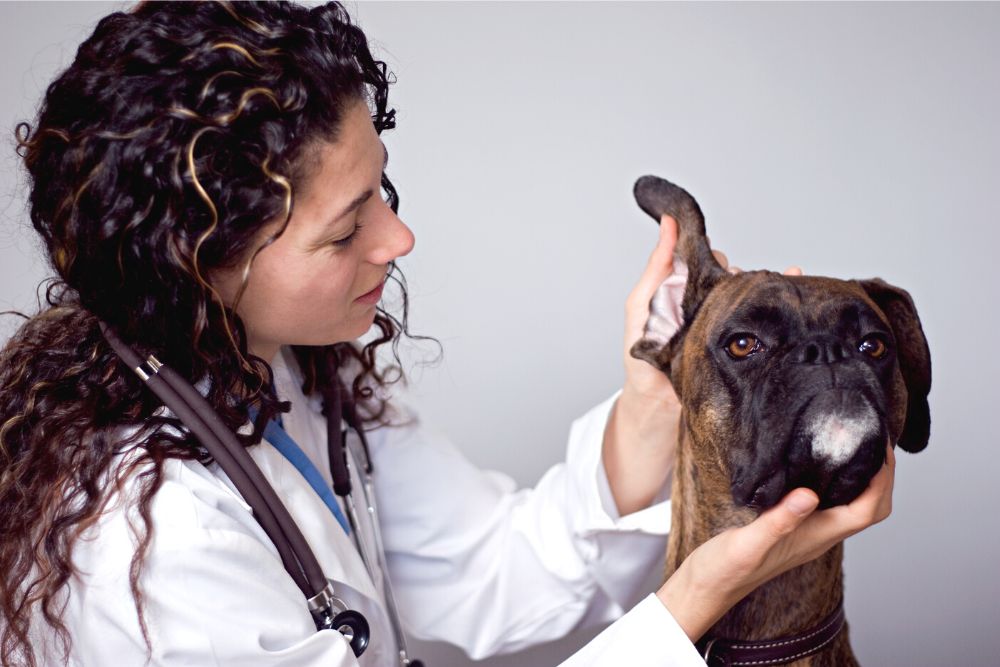Table of Contents
The Most Popular Types of Veterinary Jobs
Have you found yourself daydreaming about animal care lately? Wondering how to diagnose and treat farm animals? Curious about what level of veterinary training is required for which type of veterinary job?
It sounds like you’ve got a passion to work in the veterinary industry! And while many roles require years of school and training, some don’t require any. Check out this handy list of different types of veterinary jobs to see which one is right for you today.
Veterinary Assistant
Does your family call you an animal whisperer? Do you enjoy checking small tasks off a to-do list? Have you always been curious about what it’s like to have a veterinary career? If the answer is yes to any of these, a veterinary assistant job might be the perfect opportunity for you.
As a vet assistant, you work with licensed veterinarians to keep everything running smoothly. Each day is filled with variety: one minute, you might clean a kennel, and the next, you might hold an animal still during a procedure. And then you’re off to administer medication and communicate with pet owners. There is never a dull day as a veterinary assistant!
Plus, this job is perfect for those passionate about animals and looking to see if the animal health profession is right for them. You’ll get to see all types of veterinarians in action and learn the ins and outs of animal clinics. Little to no training is required to become a veterinary assistant—just a willing attitude and a love for animals. Everything else you’ll learn on the job.
View All: Veterinary Assistant Jobs
Skills Top-Notch Vet Assistants Possess
Resilience: Working in a veterinary clinic or animal hospital requires physical and emotional strength. Large animals are heavy, and it is often the assistant’s job to lift them onto the exam table or hold them still during a procedure. It can also be emotionally taxing to see hurt and sick companion animals. It takes tremendous resilience to conduct your job with kindness and compassion, as well as fortitude and strength.
Communication: As the assistant, you constantly communicate with others—the lead veterinarian, other staff members, pet owners, and even the animals themselves. Having the ability to communicate clearly and effectively is essential to becoming a highly dependable assistant.
Eagerness to Learn: The veterinary profession is nuanced and complex. There is much to learn about medicine, caring for animals, and running a successful practice. As the assistant, you have a front-row seat to all the action. Since there are no education requirements necessary for the job, take advantage of the opportunity to learn from those who have worked in the veterinary business for years.
Opportunities for Career Advancement
As a veterinary assistant, there is nowhere to go but up! To do so, however, you’ll need to receive some more training. Becoming a veterinary technician requires at least an associate’s degree, and becoming a veterinarian requires a bachelor’s degree in veterinary medicine. If you love working at a veterinary clinic or animal hospital, it is worthwhile to consider pursuing higher education to become further trained in the profession.
Veterinary Technicians
A veterinary technician is to a veterinarian what a nurse is to a doctor. You are the licensed veterinarian’s right-hand person, providing hands-on care and assisting the vet in all tasks.
You record medical histories, observe and document animal behavior, collect lab samples for analysis, and administer medication. You will also assist the veterinarian during examinations, treatment, and surgeries.
Veterinarian Technicians can do more than veterinary assistants, as they are more highly trained. For example, vet technicians can administer anesthesia, suture skin wounds, remove teeth, and place a catheter.
Each state has different requirements for veterinary technicians. Still, most require you to have an associate’s degree, and many require certification/licensing.
View All: Veterinary Technician Jobs
Skills Top-Notch Veterinary Technicians Possess
Manual Dexterity: From giving vaccinations to examining teeth, each task of a vet tech requires deft hand movement and nimble fingers. It’s not easy to poke around in a canine’s mouth, much less extract a tooth or get a clear x-ray from a jumpy animal. Each task requires excellent hand-eye coordination and a steady, precise hand.
Humility: While you have graduated from many of the responsibilities of the veterinary assistant, you are still asked to do a number of menial tasks. Vet clinics are often run like a family—everyone is asked to pitch in. That might mean you go from assisting in a high-level surgery to cleaning poop off the examination table. It takes humility to see all tasks as worthy and passion to joyfully contribute to the health of the whole clinic.
Compassion: You will care for animals who are sick, dying, and have suffered abuse. You will communicate with pet owners gripped with grief and fear. And each time, you will be required to respond with compassion, empathy, and care. It is an emotional job to care for the health of animals, and it is crucial to approach it tenderly.
Opportunities for Career Advancement
There are many opportunities for career advancement when you are a veterinary technician. To become a doctor of veterinary medicine (DVM), you need to complete a bachelor’s degree and be certified by the American Veterinary Medical Association (AVMA).
It is also wise to pursue a specialization in animal care, whether dentistry, anesthesiology, zoology, or urgent care. You can also choose to work with small animals, farm animals, or even exotic animals. Focusing on a particular area of specialty will give you more options, greater career mobility, and higher earnings in your veterinary career.
Become an AmeriVet Partner
We’re AmeriVet. We’re that genuine ‘unicorn’ of corporate veterinary partners. With us, it’s about collaborating and becoming true partners.
Veterinary Receptionists & Office Roles
Do you love animals and want to work with them, but the thought of administering a shot makes you squirm? Do you want to work in health care but have no interest in studying medicine? Working as a receptionist or another office staff member might be the perfect option for you.
As a receptionist, you are the first person patients and their owners interact with. You set the tone for their experience and create a warm, friendly, and professional environment. Beyond greeting visitors, you also answer the phone, schedule appointments, collect payments, sell pet items, and maintain records.
While it is not required that you have a degree, many clinics, private practices, and veterinary hospitals look for those who do. An associate’s or bachelor’s degree in communications or business will set you apart from other applicants.
Your job is critical to ensuring that patients feel cared for, veterinarians feel supported, and the clinic runs smoothly.
Skills Top-Notch Receptionists Possess
Detail-Oriented: You are the one the entire team relies on to keep it all straight: who is coming in at what time, what procedures they need, and if everyone has paid on time. All of this requires a strong eye for detail. Whether you are entering data, keeping records up to date, or remembering the name of each animal visitor, your knack for remembering each and every piece of information will make you an indispensable receptionist.
Know the Lingo: While you don’t need to go to medical school to be a receptionist, you do need to understand the terminology and speak the language. It is crucial that when the veterinarian mentions different medicines, equipment, diseases, and the like, you can follow along, converse, and keep accurate records.
Friendly and Warm: As a client-facing staff member, you set the tone for the entire clinic. Your warmth will welcome patients into the space, your smile will put them at ease, and your professionalism will let them know they are in good hands.
Opportunities for Career Advancement
As a receptionist, there are always opportunities for promotions and raises. The more training you have and the longer you have worked at a clinic, the higher your wages will be. You can also move into managerial roles among the office staff.
Some receptionists decide they love the profession and go on to become veterinarians themselves!
Veterinary Practice Managers
Do you love establishing systems and smoothing out processes? Are you excited by the prospect of saving money and balancing the books? Do you want to help those around you perform their jobs to the best of their abilities? Then the role of a veterinary practice manager is just the one for you.
As the Veterinary Practice Manager, you ensure that all parts of the business run smoothly. You take care of all the behind-the-scenes work so that veterinarians can focus on what they do best: caring for animals. That means you handle the finances, manage medical records, supervise the staff, communicate with clients, and oversee your clinic’s involvement with vendors.
Your goal is to create a welcoming and warm environment in a practice that cares for its patients well and makes a profit to boot.
Skills Top-Notch Vet Practice Manager Possess
Business Management: You are in charge of ensuring the clinical practice makes a profit, and that requires a deep knowledge of all things business. From hiring and managing staff to maintaining standards of quality care to keeping the books, you work to make sure it’s all in order.
Leadership: As the practice manager, it is vital to have strong leadership skills. It is your job to set goals for the clinic, make tough decisions, and create a healthy work environment. But you also need to form strong relationships with your staff, ensure patients are cared for, and delegate tasks. It takes strong interpersonal skills, strength of character, and a whole lot of humility to lead a team well.
Love for Animals: While you are the business mind at the clinic or hospital, it is crucial that you also have a passion for animals. That is, after all, the business you’re in, and you want your clinic to radiate care from each staff member, no matter their role. To set that tone, you yourself must also love those furry friends.
Opportunities for Career Advancement
There are several ways to advance as a veterinary practice manager. For one, becoming a Certified Vet Practice Manager is highly regarded in the industry. It will increase your hireability and earning bracket. You can also choose to specialize, becoming skilled at running clinics, hospitals, or rural practices.
There is also excellent job mobility regarding the size and location of the practice you manage. If you switch to a larger practice or one in a more lucrative area, you will increase your responsibilities and income. And if you have an entrepreneurial bone, you can even open your own clinic to manage.
Tips on Finding a Veterinary Job Perfect For You
There is no one-size-fits-all answer when it comes to finding the right job for you. So much of it comes down to your personality and preferences, experience level, and overall career goals. As you consider different roles in the veterinary industry, here are a few tips to guide you in your search.
Know Thyself: What is Most Important to You
When searching for a job, knowing what factors are most important to you is crucial. If a solid work-life balance is vital, ask questions when interviewing to try to understand how they operate. Working in a veterinary practice is difficult and requires long hours on your feet. Make sure to find a job that feels sustainable to you.
What about the practice’s standard of care? As one who cares deeply about animal welfare, you want to be surrounded by others who invest the same passion in each of their patients. Your colleagues should inspire you to be the best veterinary caregiver possible. Read the reviews of the clinic you are considering working with to get to know its reputation.
You may feel strongly about the quality of equipment and facilities. Having the right tools and resources makes your job much easier and smoother. If this is a top priority, look for shelters, hospitals, and clinics with state-of-the-art equipment.
Consider Different Locations
Animal shelters, neighborhood clinics, and specialty hospitals are experiencing staff shortages across the United States. There is a considerable need for assistants, technicians, customer service representatives, and managers at all veterinary clinics. And for you, hunting for a job, that’s excellent news.
But that also might mean that the perfect job is located in some place you’ve never considered. Be open and flexible about where you live and work. You might be surprised how much you like a place, especially when the job’s a good fit.
Be Proactive
You can search several job boards to find the perfect fit. The American Veterinary Medical Association and American Animal Hospital Association have great career centers. You can also search veterinary medical associations by state and region and find jobs there. Indeed and LinkedIn, though not industry-specific, can also be great resources. Veterinary partner groups often manage job listings for all their practices so, if you know the company you want to work for, you can go directly to their careers page.
Be Patient
Finding the perfect fit takes a lot of work. It takes time to find a job, apply for it, interview, and see if the practice is a good fit for you (and you are a good fit for it!). You are looking for a place that both inspires you and values you—and that is well worth the wait!





